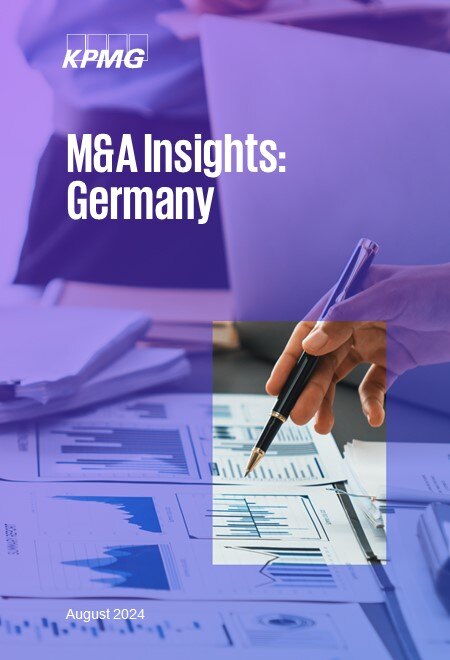M&A Insights Germany - Issue August 2024
In this issue, we will reflect on the transaction and M&A environment of H1 2024. Our review will be supplemented with an outlook on observable trends that are expected to shape the M&A market in Germany in the future.

Twice a year, we provide you with an overview of the German transaction market. We give you insights into the top deals that have shaped the market, analyze the sectors that have seen particularly high transaction activity and highlight the trends that will impact the market in the future.
In this issue:
- M&A activity: M&A activity in H1 2024 decreased compared to H1 2023, reflecting cautious market sentiments and a challenging economic environment. A rebound in deal activity in H2 2024 is expected, which is reflected in a strong pipeline of large deals.
- Industry segmentation: The technology sector continued to attract investors with strong enabling technologies. Within life sciences and healthcare, deal activity was driven by strategic partnerships, cross-sector collaborations and divestment of non-core assets. The energy sector was driven by large-cap transactions and growing interest in renewables and battery storage.
- M&A trends: Transaction activity is expected to experience a rebound. Financing conditions for M&A deals improved recently as banks show increased willingness to finance LBOs via widely spread syndicated loans. Germany is becoming an attractive destination especially for US buyers due to lower valuations and a strong USD. Thus, the need for transformation and divestment of non-core and unprofitable businesses is a driver for the increase in transaction activity. In addition, the struggle to find successors within family companies in Germany's strong mid-market sector has helped to keep this M&A market buoyant in recent times and will continue to sustain the deal landscape further down the line.
- Typical characteristics of German transactions: The environment for transactions in Germany has various peculiarities. For example, the language barrier and German legal texts can pose a challenge for foreign investors. For smaller transactions German GAAP is usually applied. This can lead to differences when compared to IFRS or US GAAP, e.g., in respect to accounting for provisions. The financial due diligence approach tends to be less "audit"-driven than in other jurisdictions, such as in the US.
Find out more details in our latest edition. Our newsletter is published twice a year. Subscribe and make sure you never miss an issue.
